- Admissions
- Academics
- Research Office
- Student Life
- News & Events
- Outreach
- About
Dr. Imran Afgan read Mechanical Engineering at the GIK Institute of Engineering Sciences and Technology Pakistan (1995-1999) and obtained his Ph.D. from The University of Manchester in 2007. He is currently an Associate Professor at Khalifa University in the UAE. Prior to this, he held positions at the University of Manchester (United Kingdom), Université Pierre et Marie Curie (France), Électricité de France (EDF), and Air University (Pakistan). . Dr. Afgan is a chartered engineering (CEng) and a Fellow of the Institution of Mechanical Engineers UK (FIMechE). He is also a Fellow of the Higher Education Academy (UK) and a registered Professional Engineer (PEC). He was the recipient of the 23rd Harold Jan Schoemaker Award and Medal, presented by the International Association for Hydro-Environment Engineering and Research (IAHR).
Dr. Imran Afgan is an expert in massively parallel computing with a particular focus on high-fidelity simulations, including Large Eddy Simulations (LES) and Direct Numerical Simulations (DNS). His primary research interests encompass turbulence modeling, conjugate heat transfer, uncertainty quantification, fluid-structure interaction, aeroacoustics, hybrid dual mesh methods, and the development of wall functions. Dr. Afgan’s applied research in nuclear thermal hydraulics and renewable energy (wind, tidal, and solar thermal) has resulted in numerous successful grant applications, securing over USD 12 million in total funding. He has served as the lead researcher for several high-profile projects, including the Performance Assessment of Wave and Tidal Array System (PerAWAT), funded by DNV-GL, the Reliable Data Acquisition Platform for Tidal (ReDAPT), commissioned by the Energy Technology Institute (ETI), and the Computations for Advanced Reactor Engineering (CARE) project, funded by the EPSRC (2011-2012). Dr. Afgan was also a co-investigator for the Extreme Loading of Marine Energy Devices due to Waves, Current, Flotsam, and Mammal Impact (X-Med) project, funded by EPSRC (2012-2015), and for Hybrid RANS/LES developments funded by Siemens (2016-2018).
Dr. Afgan has led several projects funded by the UK Department for Business, Energy and Industrial Strategy (BEIS), including the Nuclear Energy and Trainings (NEaT) initiative (2018-2019) and the Engineering Sustainable Solar Energy and Thermocline Alternatives (ESSEnTiAl) project (2018-2021). He also served as a co-investigator for the ORE EPSRC Supergen Offshore Renewable Energy Hub (2018-2022) and the Horizon 2020-funded A New Technology Innovation for Foreign Object Debris Removal (ANTIFOD) project (2018-2022).
More recently, Dr. Afgan led the thermal hydraulics theme of the Ministry of Education's grant on Accident Tolerant Fuels for APR 1400 reactors (2019-2024). He was also a co-investigator for the ASPIRE grants on Molten Corium Concrete Interaction (MCCI) (2022-2024) and Ship Wake Stability Modeling (2022-2025). Currently, Dr. Afgan is the leading several projects funded by the Abu Dhabi government and Khalifa University, including the Biomimetic Joint-Thrust System for Underwater Propulsion in Soft Robotics, Coupling Material Science with Fluid Dynamics: High Fidelity Experiments and Digital Twin for Flow Accelerated Corrosion.
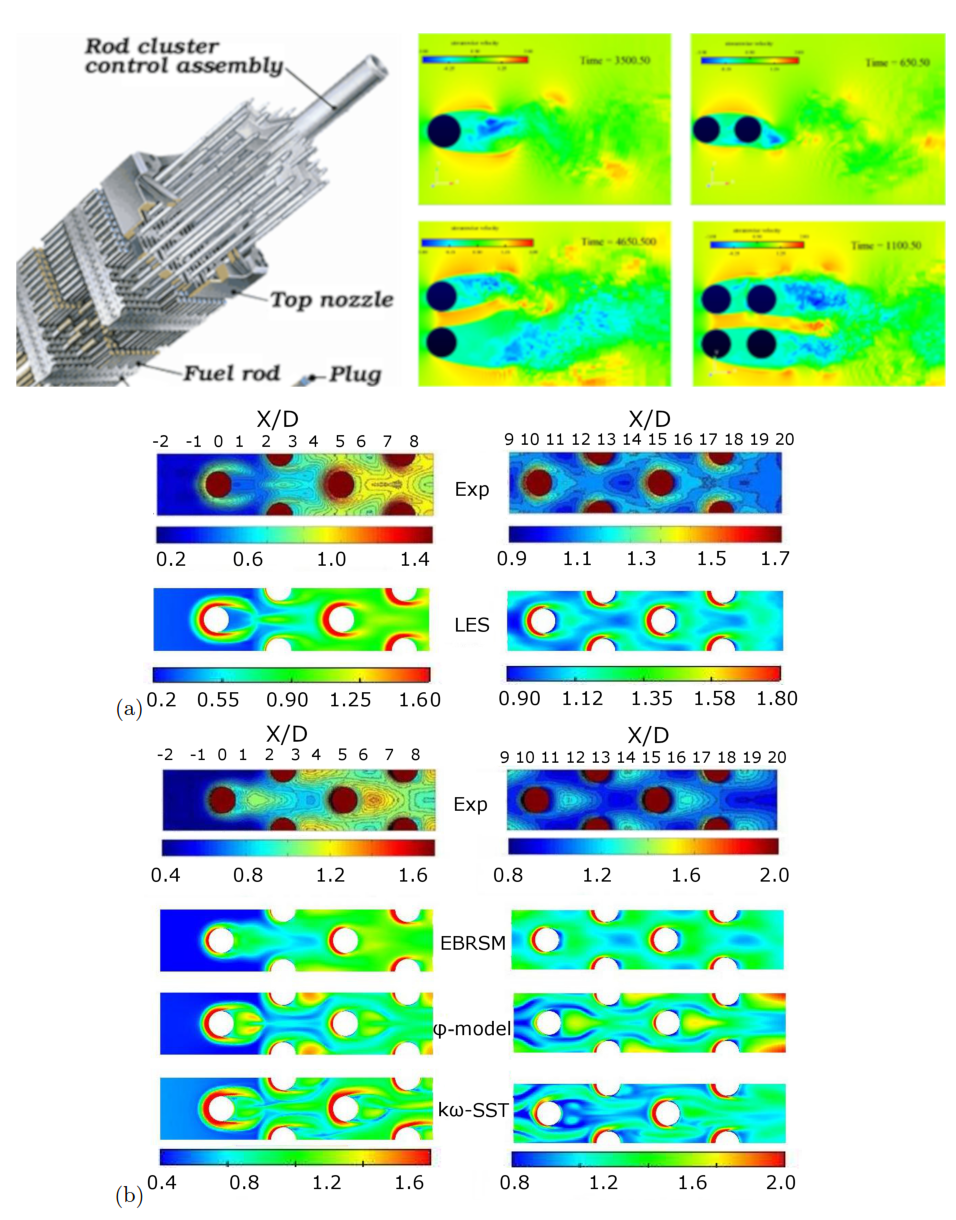
Enhancing modelling and simulation tools using uncertainty quantification and machine learning for multi-physics problems.
Nuclear and hydro power generation techniques have an important role to play in UAE’s 2030 energy vision of low carbon sources to meet future energy demand. UAE is currently investing in installation of a number of conventional hydro power plants and its first nuclear power plant, Barakah. For these plants to operate at high efficiencies and to satisfy stringent safety requirements a step-change is consequently needed in modelling and simulation capabilities; to accurately describe the multi-physics (coupled thermal hydraulics and solid mechanics) processes. This research not only targets the wider thermal-hydraulics modelling/design planned activities of UAE’s 2030 energy vision but also directly supports the “UAE Strategy for Artificial Intelligence (AI)” which emphasis strongly on the automation of renewable energy and space sectors. The main objectives of this research are to 1) enhance the modelling and simulation tools for Fluid Structure Interactions (FSI) and Conjugate-Heat-Transfer (CHT), which govern plant steady and transient operations. 2) develop reliable and versatile physical models for modelling and simulation algorithms.
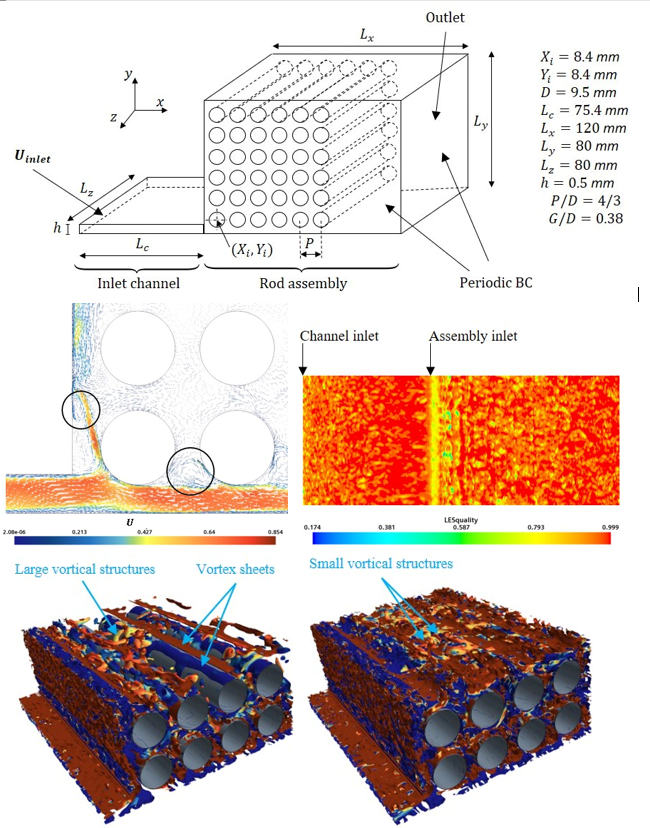
Thermal analysis of baffle jetting in fuel rod assembly
For nuclear power plants, flow-induced vibrations may occur within the reactor core, heat exchangers, and steam generators. For pressurized-water nuclear reactors (PWR), cold water flows within the reactor core to extract heat generated by the fuel rods. The flow is mainly upward axial and parallel to the fuel rods and may cause rod vibrations. However, a part of the flow passes horizontally through the gaps between the baffle plates surrounding the core, this leads to a transverse turbulent jet impinging the rods. This particular non-uniform cross-flow, known as baffle jetting, induces rod vibrations and is the cause of many grid-to-rod fretting problems.
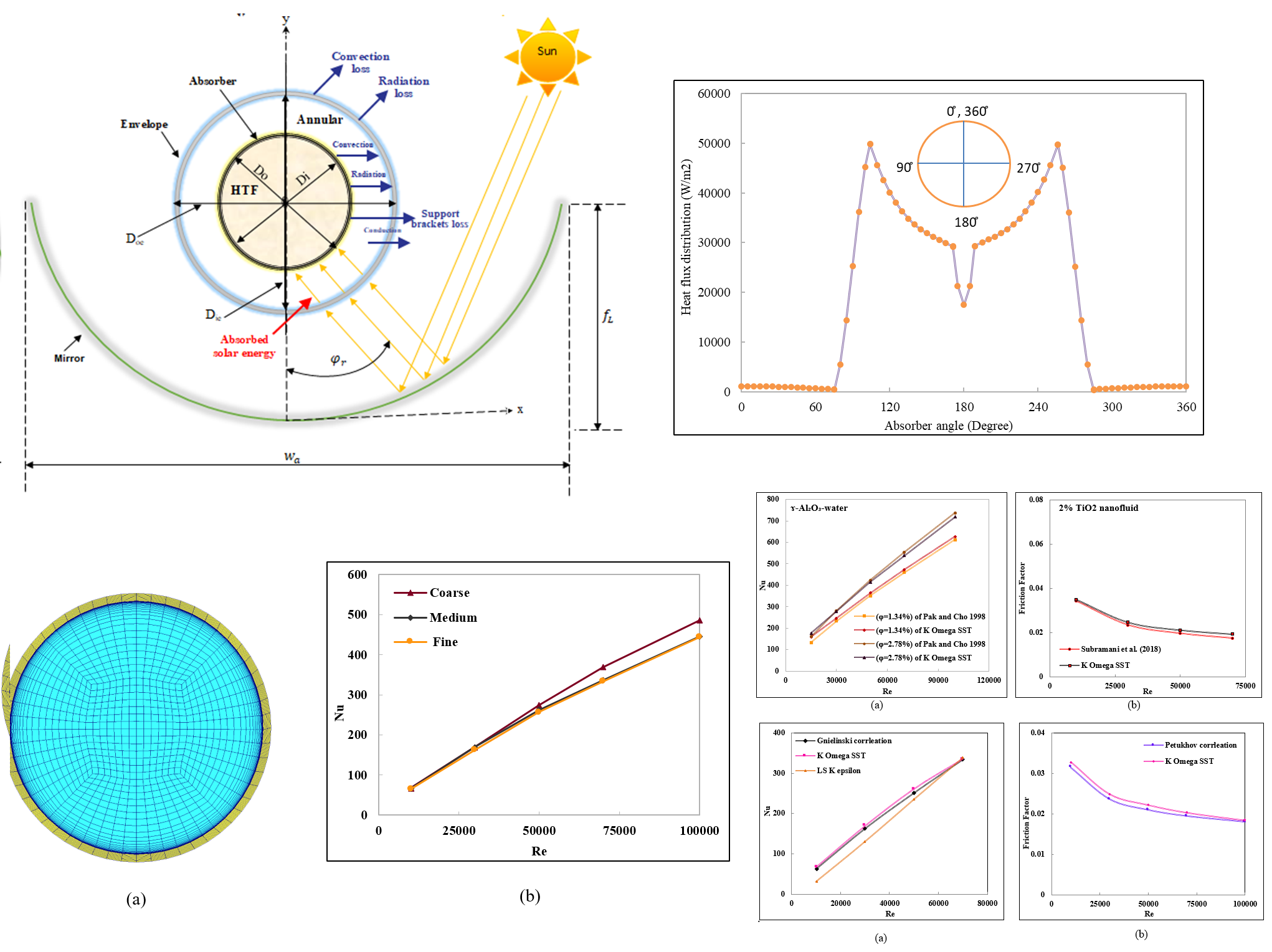
Engineering Sustainable Solar Energy and Thermocline Alternatives
Parabolic trough CSP works on the principle of harnessing solar thermal energy which is used to heat up a working fluid thereby generating electricity via steam; excess heat can also be stored in thermal storage tanks, thus leading to an uninterrupted power in contrast to other RE resources. The two main goals of this research are: 1) Enhancement of energy production from CSP via use of Nano-Particles (nanoparticles) and induced swirl using experiments and simulations. 2) Improvement of efficiency and design of thermocline energy storage systems.
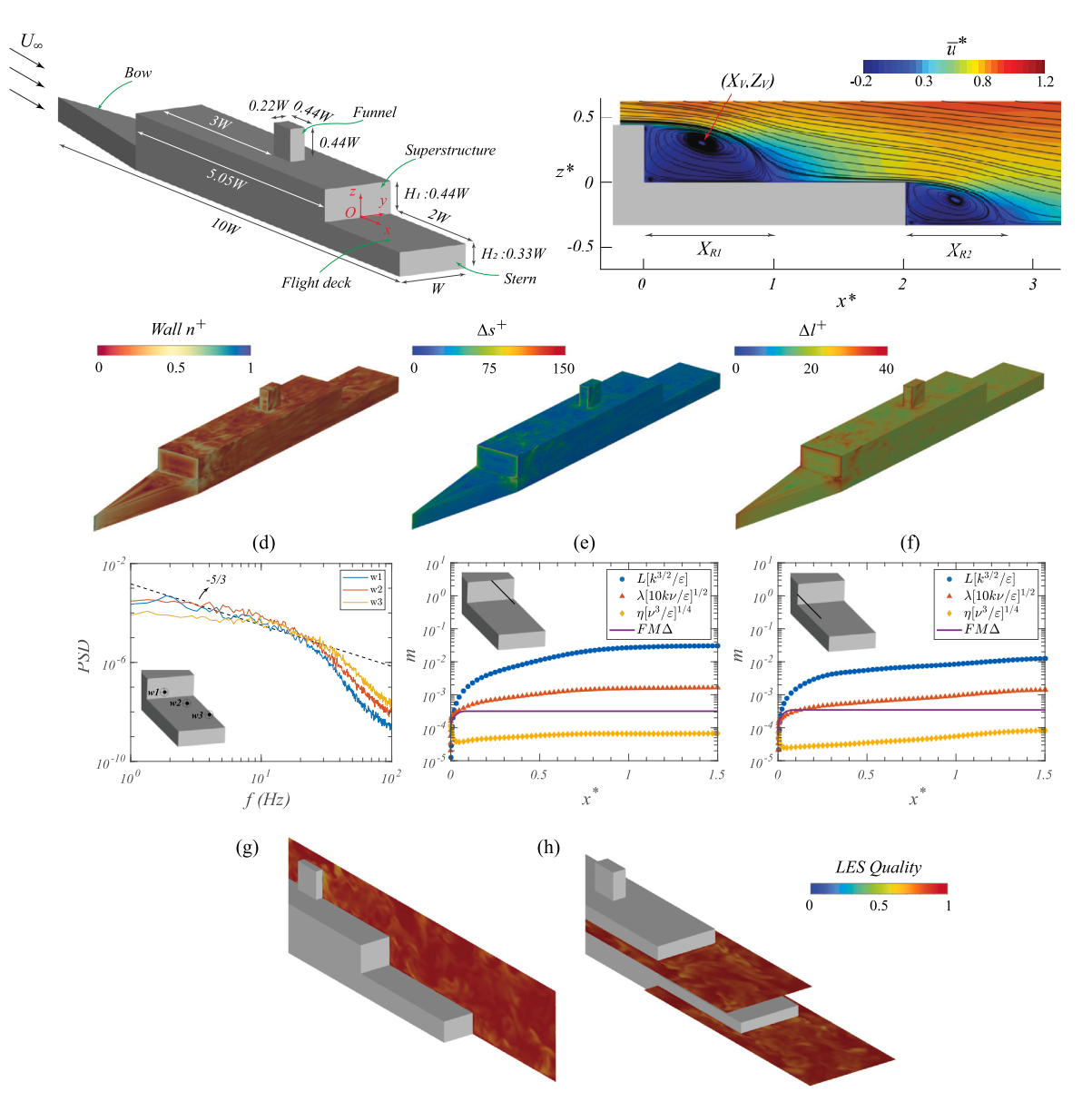
Predictive modelling of a turbulent airwake behind a ship’s superstructure using Machine Learning
One of the major factors contributing to the complexity of helicopter seaborne operations are the unsteady aerodynamic phenomena, arising from the airflow separation from the bluff rear of the ship (hangar deck). These phenomena are responsible for intense turbulent fluctuations and intermittent changes in wind direction near the helipad, leading to an immense increase of the pilot workload at the most crucial moments of the landing procedure or even a complete shutdown of flight deck operations. The aim of the current proposal is to develop predictive models for the turbulent wake of the ship’s superstructure using experimental measurements and high-fidelity numerical modelling. Data driven Machine Learning (ML) techniques will be employed to create a model which can (in practical conditions) be used to derive the full airwake information from a limited set of sensors, typically used on real ships.
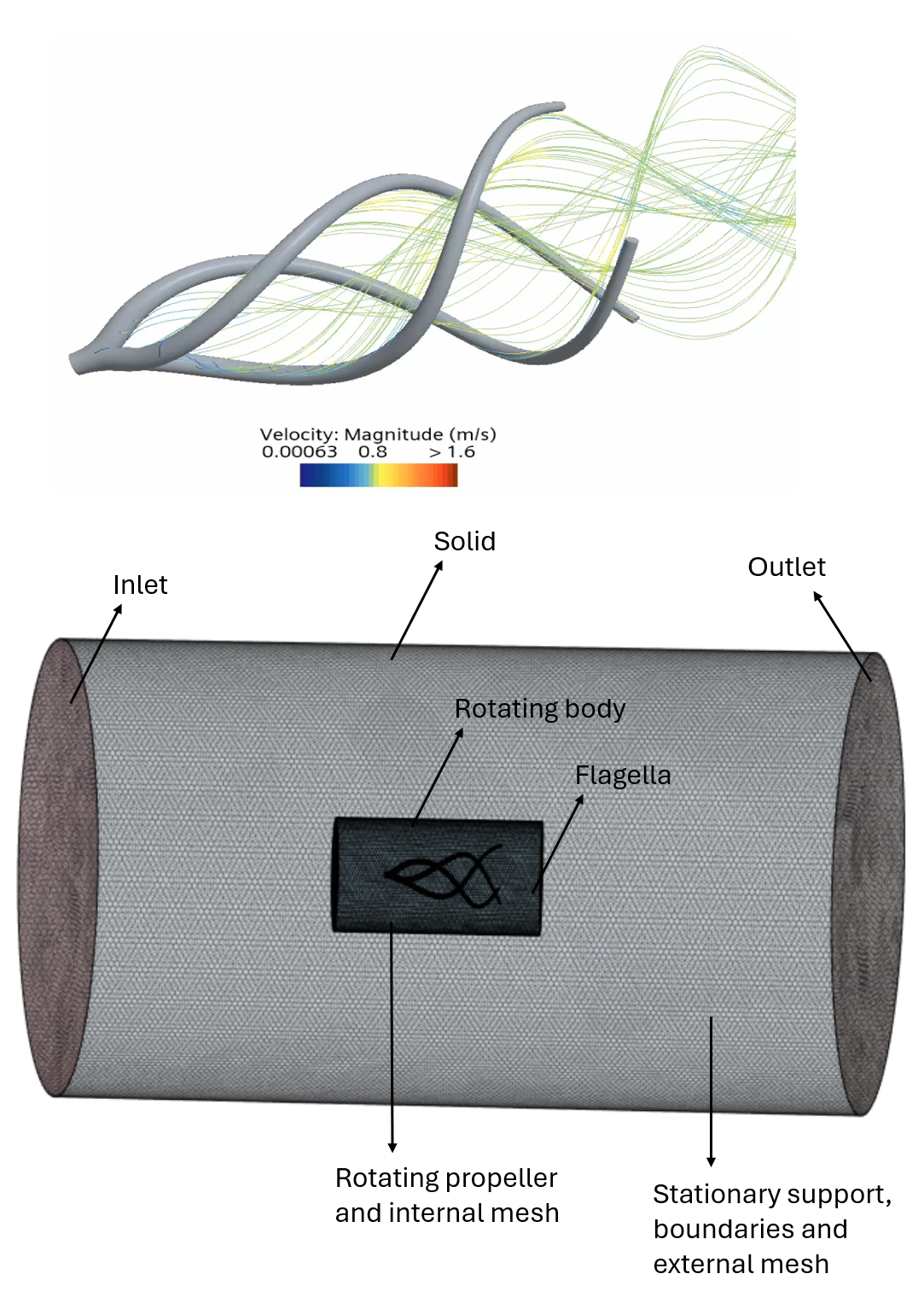
Biomimetic-joint-thrust system for underwater propulsion
Jet propulsion is an energy-efficient mechanism employed in traditional aerospace and marine engines, consisting of a fast-moving jet of fluid to generate a propulsive thrust. This mechanism is also at the base of the swimming strategies of several marine species. By pointing the jet outlet indifferent directions and by changing the amount of water drawn, cephalopods (squid or octopi) can modify the direction and speed of their jet propulsion. Inspired by this, we present a soft jet propulsor that can control the outlet position and orientation. The design combines the actuation required for the volume squeezing at the base of the jet propulsion mechanism, with a second actuator to define the orientation of the propulsor. This thruster has the potential to unveil an effective solution for a broad range of tasks currently unsolved, combining the high-speed manoeuvrability of traditional rigid jet propellers with the main advantages of soft robotics.
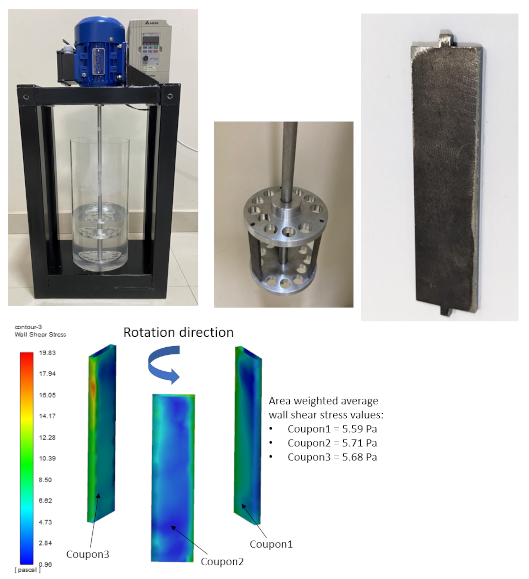
Coupling Material Science with Fluid Dynamics: High Fidelity Experiments and Digital Twin for Flow Accelerated Corrosion
Assessment of plant safe operational lifespan through prediction of damage to its critical thermal hydraulic components is a very important issue for petroleum, chemical, and other energy sectors. This becomes even more so important in nuclear power plants where safety is of paramount importance. Damage to these thermal hydraulic components over time is mainly due to corrosion. Current corrosion measurement techniques typically rely on steady or mean measurements, which overlook the transient corrosion damage rates and fail to differentiate between fluid-induced and chemical reaction-induced damage. Existing techniques lack the capability to accurately predict the rate of corrosion damage. The proposed research is innovative as it focuses on three key aspects of corrosion damage: flow-accelerated corrosion through simulations and experiments, chemical reaction modelling, and real-time electrochemical measurements, all in a transient manner. This holistic approach of integrating fluid-material interactions is vital for industry and has not been previously explored or implemented.
FHEA, CEng, FIMechE